Mercy towards the Sick: the Hermeneutic Criterion of Historical Research?
***
Our history is the history of our soul; and the history of the human soul is the history of the world.
Benedetto Croce, La storia come pensiero e come azione
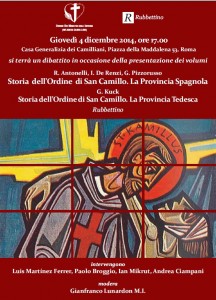 On Thursday 4 December of this year at 17.00, at our generalate house, there will be the launch of the latest two volumes published in the series of historical research on the oldest Camillian Provinces: Storia dell’Ordine di San Camillo. La Provincia Spagnola, Raoul Antonelli, Isabella De Renzi, Giovanni Pizzorusso, Rubbettino Editore, Catanzaro, 2014, 168pp and Storia dell’Ordine di San Camillo. La Provincia Tedesca, Gerhard Kuck, Rubbettino Editore, Catanzaro, 2014, 112pp.
On Thursday 4 December of this year at 17.00, at our generalate house, there will be the launch of the latest two volumes published in the series of historical research on the oldest Camillian Provinces: Storia dell’Ordine di San Camillo. La Provincia Spagnola, Raoul Antonelli, Isabella De Renzi, Giovanni Pizzorusso, Rubbettino Editore, Catanzaro, 2014, 168pp and Storia dell’Ordine di San Camillo. La Provincia Tedesca, Gerhard Kuck, Rubbettino Editore, Catanzaro, 2014, 112pp.
This is a further stage of a project which began a number of years ago and which was entrusted to the General Consulta and a group of scholars and researchers: a project designed to full a hole in the historical recognition of the life of our Order, that is to say a systematic exploration of its foundation, its development, and the interpretation of the charism that the individual Provinces have offered down the centuries.
This study was conceived as an integral part of the project for the reorganisation of the general archives, a subject so important to the then Superior General Fr. Angelo Brusco that in the Status Ordinis he declared: ‘The work involving the updating of the general archives has not failed to produce good results. The situation, however, is still far from being satisfactory. Given that it has not been possible to find a permanent archivist, we have had to be satisfied with partial solutions. I associate the incompleteness of the history of the Order with the inadequate solutions as regards the archives’.
A few years later this was echoed by another Superior General, Fr. Frank Monks: ‘Ever since I was a child, I have always been fascinated by the number of citizens of the United States of America who have returned to Ireland looking for traces of their roots. I remember their joy in finding the name of their grandfather or great-grandfather in the register of baptisms of a village. Their joy was contagious. This taught me how important it is for all of us to be aware of our origins if we really want to appreciate the set of values that guide us and if we want to plan the direction in which we want to walk. The Second Vatican Council invited all religious to return to the original sources in order to rediscover the spirit of their founders. This would be an almost impossible task for us Camillians if there had not been people who had dedicated themselves and worked hard to conserve the documentation that goes back to the beginning of our foundation. We have a glorious history of which we can be proud, even though there is no lack of shadows. I am aware of the great debt that we have towards our ancestors because without their vision and without their work to conserve all that ancient material, we would be faced with an impossible task’ (from the introduction to Archivio dei Camilliani: studi e problemi, edited by J. Ickx, G. Pizzorusso and E.A. Talamo, Rubettino 2006).
The original plan of the research project envisaged eight publications. Hitherto, five volumes have been published: Aspetti e problemi della storia dell’Ordine di San Camillo; Storia dell’Ordine di San Camillo. La Provincia Romana; Storia dell’Ordine di San Camillo. La Provincia Francese; Storia dell’Ordine di San Camillo. La Provincia Spagnola; and Storia dell’Ordina di San Camillo. La Provincia Tedesca. The volumes on the history of the Province of Piedmont, the Province of Sicily and Naples and the Province of Lombardy and Veneto are currently being completed.
In view of the appointment for the imminent launch I had a look at the minutes of the preparatory meetings and in particular that of 19 September 2005.
The preparatory group was made up of a team of lecturers and researchers: Giuliana Adorni, Sabina Andreoni, Andrea Ciampani, Carlo Fiorentino, Massimo Giannini, Gerard Kuck, Johan Ickx, Tonino Mancini, Giovanni Pizzorusso and Emilia Talamo.
The stimuli offered by Fr. Frank Monks and Fr. Francisco Alvarez had helped to give the researchers who had been entrusted with the project a clear idea of the range of the activities of the Camillians in the world. This gave new lymph and energy as regards the work that had to be begun. The deep motivations of St. Camillus and his followers was highlighted: the charism of the Founder and of the foundation has been the spring around which the experience of Camillian consecrated life has revolved. Mercy seems to be a key word by which to assess the real actuation of our chrism in history. It communicates the spirit with which every activity has taken form.
Relationships have also helped to highlight certain topics of interest: the relationship between fathers and brothers within the context of charismatic equality; the institutional relations between the Order and civil and ecclesial authorities; and the fourth vow (service to the sick even when one’s life is endangered) as a constituent fact of Camillian consecrated life.
Certain criteria of historical research were decided upon. Within the context of the questions and issues mentioned above, the central question of the continuity of the inspiration and the work of Camillus in his followers had to be addressed. To this end, the history and the bringing together of the Constitutions – the reflection of the spirit of a specific epoch and of how our religious have seen themselves – appeared to be a further comparative instrument.
Historical research in this field is not a narrated succession of facts but, rather, the description of mutual influences between the Order and the world in which it has lived. The subject of mercy can emerge as the hermeneutic key.
Inside the events the historian has to try to rediscover the constituent elements of the Order: its charismatic dimension, community involvement, and the contemporaneous care for the spiritual and the corporeal (the unity of spirit and body).
Such is the work that has been engaged in so far, with an attempt being made to be as faithful as possible to the original intention. The covers that were chosen for the volumes that have been published hitherto express the focal centre of the inspiration, the charism, the spirituality and the practice of the Camillians: St. Camillus and a strong embrace – with the heart, the soul, the look and the hands – of frail and sick man!
And what about the future? There is no absence of dreams!…Our Order, our religious Provinces, have continued to make our charismatic fire interact with time, challenging the very needs of history: contemporary history, missionary expansion, the way in which the Second Vatican Council was received, the radical revision of the Constitution, the developments of modern anthropology, the modern and post-modern perception of suffering and illness, globalised relations, the tensions between the North and the South of the world…these are some of the stages that still deserve to be suitably explored!
Fr. Gianfranco Lunardon




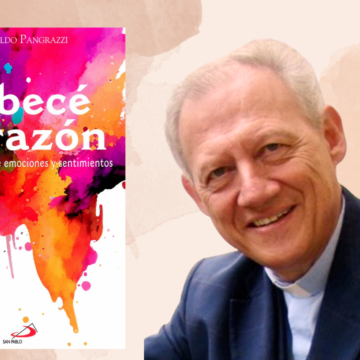





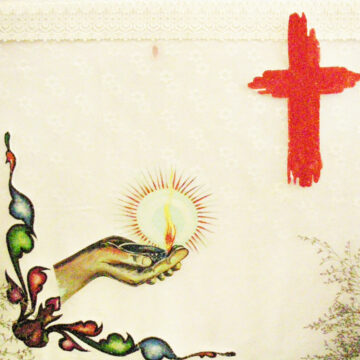
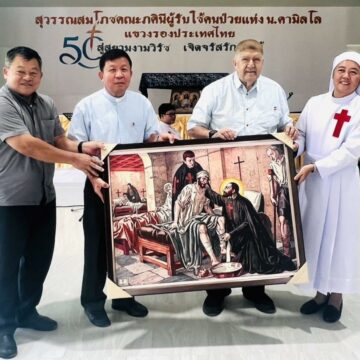
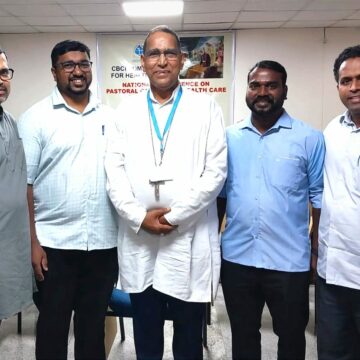

Camillians on Facebook
Camillians on Twitter
Camillians on Instagram